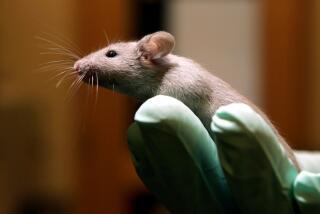Brain Cells May Turn Into Organ Tissue, Study Says
- Share via
Research in mice suggests that stem cells from the adult brain can be nurtured into heart, liver, muscle and other tissues. If the same results can be achieved with human stem cells, the finding may eliminate the ethical dilemma now blocking stem cell studies that use human fetal tissues, experts say.
The mouse study, by researchers in Sweden, found that neural stem cells taken from the central nervous systems of adult mice and transferred to mouse and chicken embryos were converted into the cell types that are found in a variety of body tissues and organs.
One part of the study, appearing today in the journal Science, showed that some neural stem cells converted to become part of a beating heart in a mouse embryo.
“This is a very exciting and interesting result,” said Ihor R. Lemischka, a professor of developmental biology at Princeton University. He said that if the research can be confirmed in human cells it will “nip in the bud” the moral and ethical concerns that now block federal funding of human embryonic stem cell research.
Under federal law, the National Institutes of Health is forbidden to finance human embryo research. In the wake of recent stem cell studies, the agency has proposed changing the regulations, but some members of Congress oppose the change.
The objections to embryonic stem cell research center on the fact that such cells must be taken from embryos or fetuses, usually after abortions.
It has long been believed that only embryonic stem cells--which are removed from the unborn--have the ability to develop into any other cell type in the body. In this process, the embryonic cells change into intermediate stem cells that, in turn, change into other basic cells, such as brain, liver and heart cells.
Experts believe that eventually stem cells may be used to grow new body parts to replace failing organs, or to treat brain, bone or blood disorders by replacing diseased cells with healthy ones grown from stem cell precursors.
Researchers believed that once an embryonic stem cell converted into an organ precursor cell it could not make any other type of organ. A neural stem cell, for instance, was thought to be able only to make neurons, astrocytes and other cells associated with the central nervous system.
But the work by scientists at the Karolinska Institute in Stockholm, Sweden, suggests that neural stem cells can revert to another form of stem cell and then help to develop organs other than the brain.






